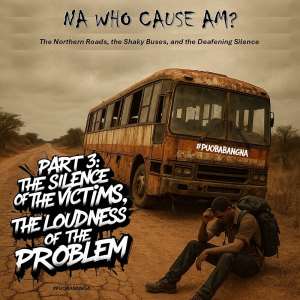
In that bus, bouncing over broken roads and broken promises, something hit me harder than the potholes: our silence.
A silence so thick, it wrapped around us like the dust cloud trailing behind. But it wasn’t the silence of calm—it was the silence of surrender. Of a people so tired, so bruised by routine suffering, that even the strength to complain had evaporated. A silence not of peace, but of resignation.
I looked around. Children pressed against their mothers. Traders clutching bags on their laps. Elders leaning against cracked windows. Their faces—grim. Their eyes—heavy. Their mouths—shut. You could hear a pin drop, even as the bus creaked and screamed across the uneven road.
No protest.
No outrage.
No fire in the voices.
Only quiet prayers, tired sighs, and the occasional resigned whisper:
“Hmm… Ghana diɛ.”
But the problem? Oh, it screams. It screams so loud it drowns even the engine.
It screams in every pothole we bounce into and out of like human cargo.
It screams in the broken shocks of the bus that jolt your spine like an electric fence.
It screams in the baby who keeps crying—not because she’s hungry, but because the shaking never stops.
It screams when we break down at 1 a.m., in the middle of nowhere, and the driver says, “Make we wait, mechanic dey come.”
It screams when there’s no mechanic. No torchlight. No help. Just darkness, mosquitoes, and prayers.
That’s how loud the problem is.
And yet, we—the victims—have gone mute.
Not because we don’t feel it. But because we’ve felt it for too long.
Because to feel something for too long without remedy turns pain into background noise.
We laugh about it now.
“This be Northern bus life.”
“Ei, the shaking go straighten your back small.”
“Just manage—next time go be better.”
But next time is always worse.
And we’ve learned to manage—a dangerous Ghanaian skill that turns injustice into a joke and failure into folklore.
Even worse, some defend the decay because their party is in power.
They tell you not to talk too much.
They say, “The government is trying.”
They say, “Things are hard everywhere.”
They say, “At least dem do some small.”
They say, “You too, why always complain?”
So we shut up.
And silence becomes culture.
Culture becomes consent.
And consent becomes complicity.
Meanwhile, institutions go to sleep.
Ministers go silent.
Projects stall.
Promises evaporate.
And the people—the ones who should shout—become ghosts in their own story.
But let me tell you something:
The loudest silence is not the one from politicians—it is the one from the people.
Because when the people stop speaking,
The leaders stop listening.
And when the leaders stop listening,
The nation stops moving.
And when the nation stops moving,
It’s not just the roads that remain broken—it’s the soul of the country.
So again, I ask—not just in anger, but with sorrow:
Na who cause am?
The leaders? The systems? The politics?
Or… is it us?
The ones who see it all, feel it all, suffer it all—yet say nothing?
Are we victims—or are we volunteers?
Because silence, too, is a choice.
And the price of that silence is the dust in our throats, the pain in our backs, the hours we waste, and the dreams that die slow deaths on broken roads.
But I didn’t write this to depress you.
I wrote it to remind you: It doesn’t have to be this way.
Because after silence must come a voice.
And after that voice must come change.
But for now, I leave you with this question—one that must haunt us into action:
Na who cause am?
Up next: Part Four – “Politics Over Progress: When Loyalty Clouds Judgement”
#Puobabangna
(The Northern Roads, the Shaky Buses, and the Deafening Silence)
By Victor Raul Puobabangna from Eggu, in the Upper West Region of Ghana


